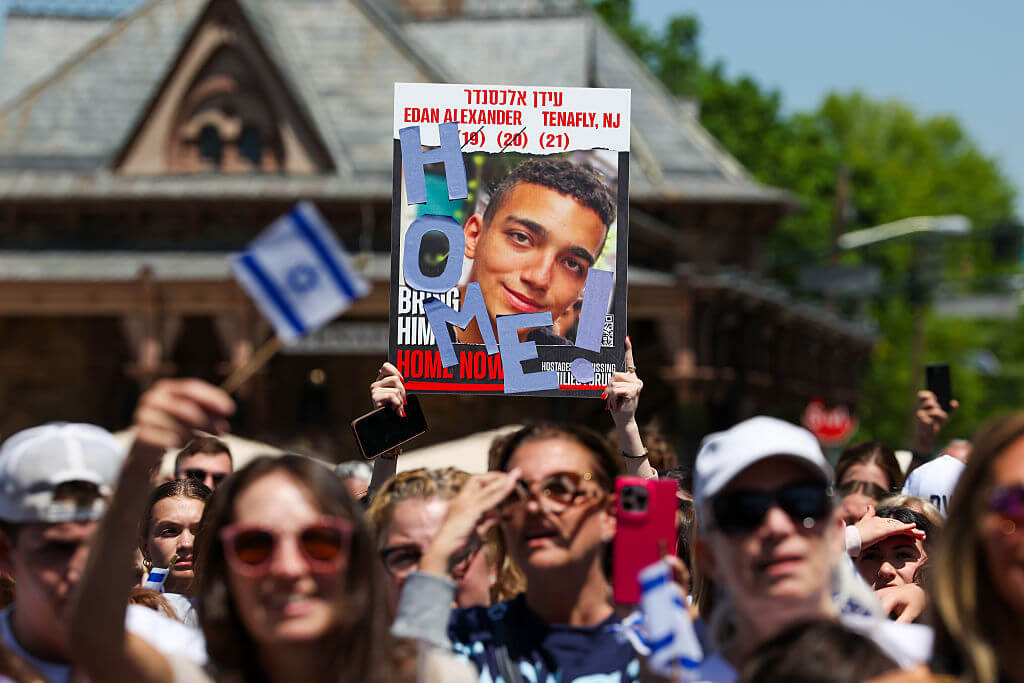A rabbi went down with his torpedoed warship in 1943. Today, his cousin ensures his story is not forgotten.
Eighty years ago today, a rabbi, a priest and two ministers made the ultimate sacrifice
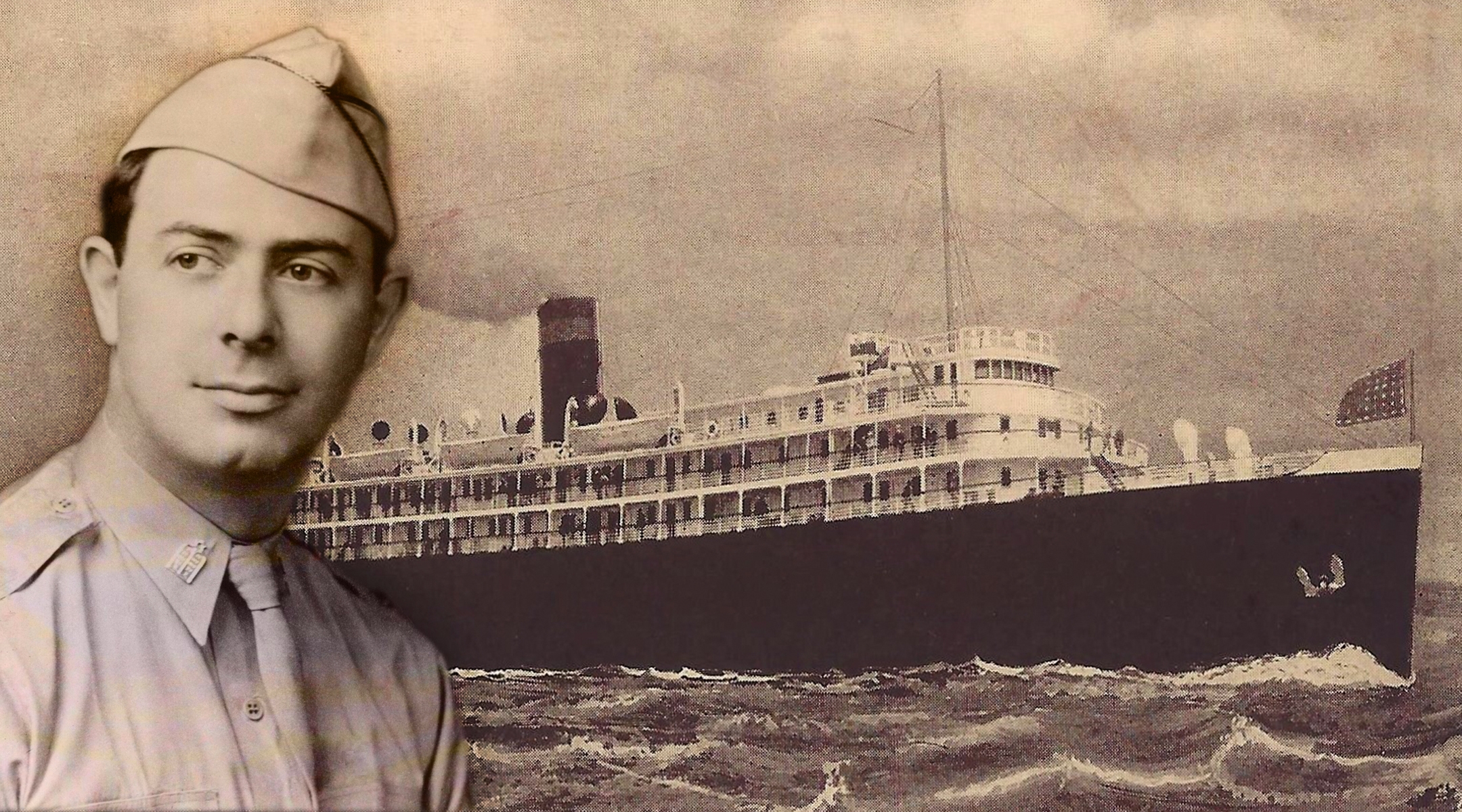
Rabbi Alexander D. Goode and a view of the Dorchester, which was requisitioned by the army during World War II. The ship was sunk by a German torpedo on Feb. 3, 1943. (Courtesy Mark Auerbach)
(JTA) — Mark Auerbach was not yet 5 years old when he noticed an unusual stamp in his father’s dresser. The well-worn three-cent stamp featured a drawing of a small group of men and a sinking ship, with the words “The Immortal Chaplains… Interfaith in action.” It piqued his interest, so he asked his father about it.
“Our cousin is on that,” Auerbach, who grew up in Brooklyn, recalls him saying, searching for an age-appropriate explanation. “He said he was a rabbi who died during World War II when his boat was torpedoed by the Germans. He made me promise to make sure that the story is never forgotten.”
It’s a promise that Auerbach, 75, who now lives in Passaic, New Jersey, has taken to heart. He’s made it his life’s mission to keep alive the story of the “Four Chaplains” — who included Auerbach’s third cousin, Rabbi Alexander D. Goode, along with Rev. George Fox, Rev. Clark Poling and Father John Washington. Eighty years ago today, they made the ultimate sacrifice when their ship, U.S.A.T. Dorchester, was torpedoed and sunk by a German submarine in the North Atlantic in the pre-dawn hours.
Over the decades, Auerbach has amassed a trove of photos, clippings and memorabilia dedicated to the bravery and faith of these four clergymen — including preserving countless copies of that three-cent stamp, which was issued in May 1948. “It’s an amazing story,” said Auerbach of the chaplains’ heroism. “It just happens to be my family.”
The sinking of the Dorchester is considered one of the country’s worst World War II-era sea disasters: Of the 902 men on board, only 203 survived. As survivors and historians attest, the four clergy — all relatively new soldiers who had befriended one another at the Army Chaplains School at Harvard University — stood out for their calming presence throughout the pandemonium that occurred during the 18 minutes it took for the ship to go under. As the tragedy rapidly unfolded, survivors reported that the chaplains offered prayers, helped distribute lifejackets and, once those ran out, they selflessly gave up their own.
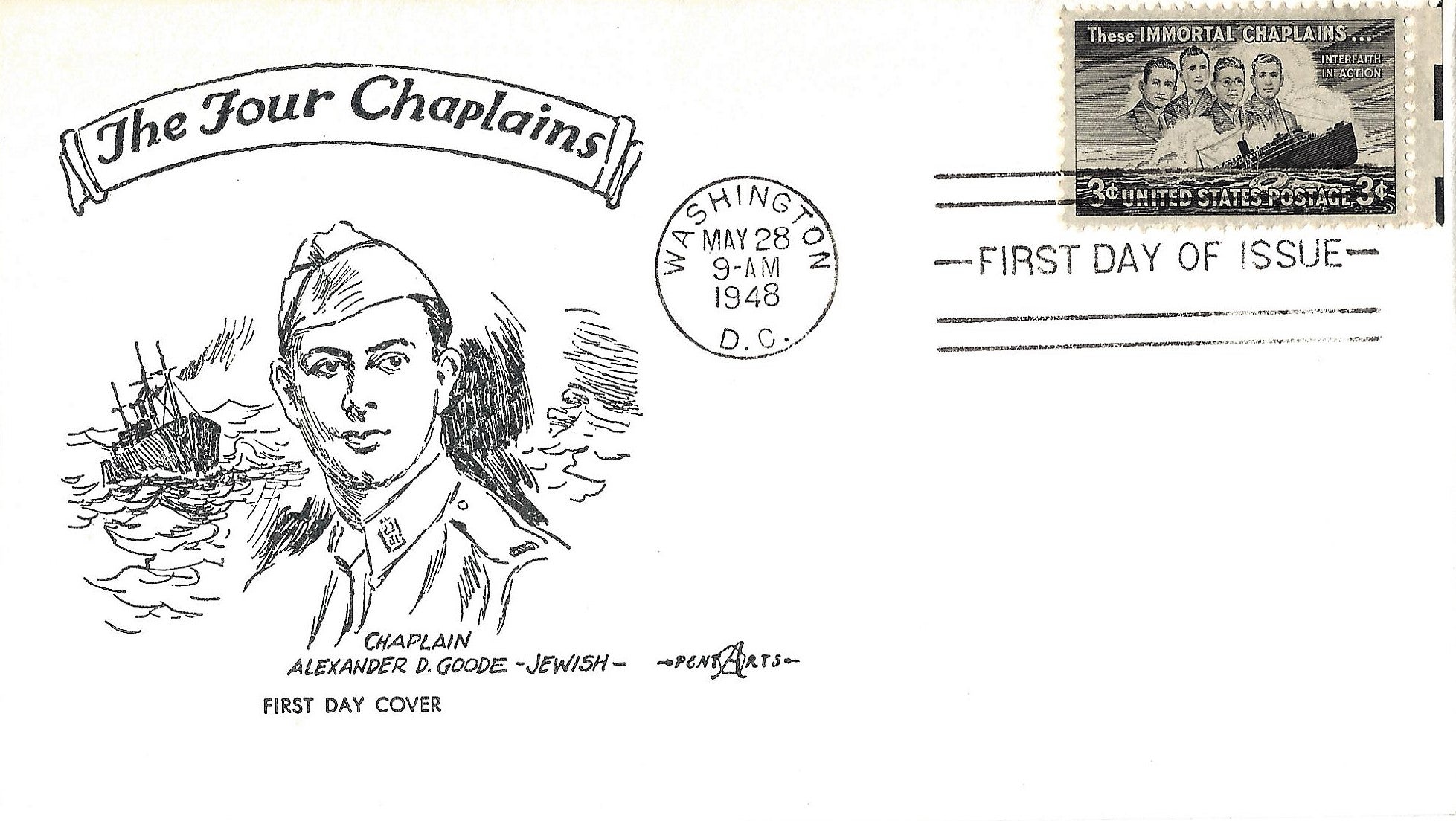
The three-cent stamp dedicated to the Four Chaplains was issued in 1948 and sparked Auerbach’s interest in the story. (Courtesy Mark Auerbach)
“The altruistic action of the four chaplains constitutes one of the purest spiritual and ethical acts a person can make,” reads materials from Four Chaplains Memorial Foundation, whose mission is “to promote Interfaith Cooperation and Selfless Service,” according to their web site. “When giving their life jackets, Rabbi Goode did not call out for a Jew; Father Washington did not call out for a Catholic; nor did the Reverends Fox and Poling call out for a Protestant. They simply gave their life jackets to the next man in line.”
But that’s not all they did. As the ship went down, survivors have said that they saw the four chaplains on deck, linked arm in arm together in prayer. “I could hear men crying, pleading, praying,” Private William B. Bednar, who was floating among the bodies of his shipmates in the freezing water, is quoted as saying in foundation reports. “I could also hear the chaplains preaching courage. Their voices were the only thing that kept me going.”
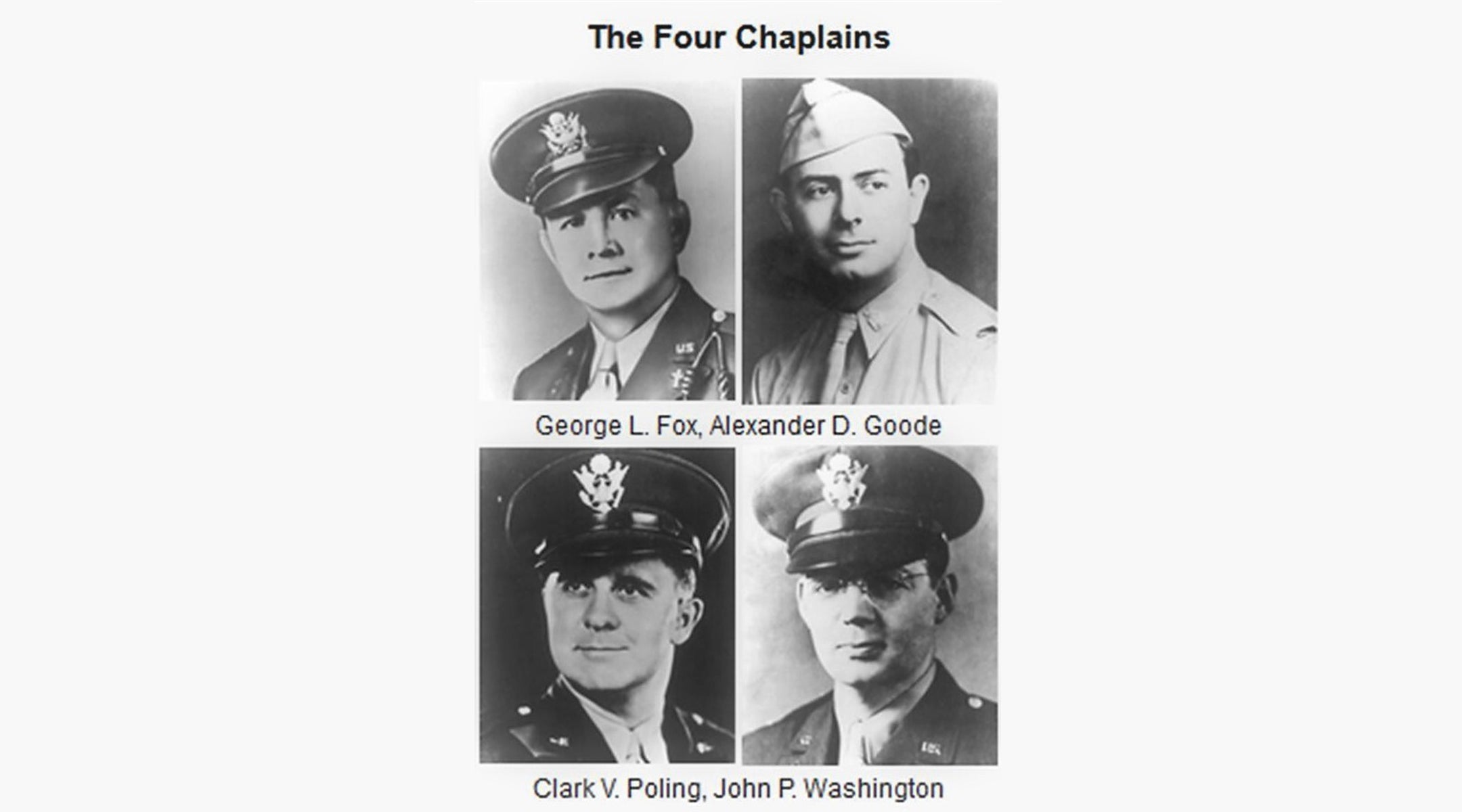
The four men became friends at chaplains school at Harvard. (Courtesy Mark Auerbach)
According to Rabbi Dov Peretz Elkins, the author of “Rabbi Alexander Goode: The Story of the Rabbi and His Three Fellow Chaplains Who Went Down with the USAT Dorchester” in November 2022, the clergy were heard saying their respective prayers as the ship sank: Goode said the Shema; the Catholic priest the Ave Maria, while the two ministers said the Lord’s Prayer. (Exactly how survivors might have heard this is unclear, though Elkins confirmed that the Shema is the last thing a Jew is supposed to say before death.)
Goode was born in Brooklyn in 1911; his father, Hyman Goodekowitz, was also a rabbi. When his parents divorced, he moved to Washington, D.C. with his mother and siblings. Goode was a good student and excellent athlete, and “believed that it was God’s plan for him to pursue a religious calling,” Elkins said.
Goode graduated from the University of Cincinnati in 1934 and Hebrew Union College in 1937; in 1940, he got a PhD from Johns Hopkins University. “Education was very important to him,” said Auerbach. In 1935, he married Teresa Flax, who happened to be a niece of Al Jolson; the couple had a daughter, Rosalie, in 1939.
As a rabbi, his first assignment was at a synagogue in Marion, Indiana in 1936; in 1937, he transferred to Beth Israel in York, Pennsylvania, where he remained until he enlisted in July 1942. “He excelled in ecumenicalism — his congregation really praised him and loved him specifically for that,” Elkins said. “He had a wonderful reputation as a scholar, a beloved rabbi and ecumenical person.”
As Elkins writes in his book: “In his new community, Alex made great efforts to spread interfaith understanding. He presented a regular radio program on religious matters. When one of the local churches burned down, he offered to host the congregation’s religious services.”
“He was an extraordinary person, [in addition to] what he did on the Dorchester,” Elkins added.
According to an account from a Dorchester survivor, Petty Officer John J. Mahoney, courtesy the Four Chaplains Foundation, Goode acted selflessly at least one more time that awful morning: He thwarted Mahoney from a foolhardy attempt to return to his cabin for his gloves. Instead, Goode gave Mahoney his gloves, assuring him he had two pairs.
In retrospect, “Mahoney realized that Rabbi Goode was not conveniently carrying two pairs of gloves, and that the rabbi had decided not to leave the Dorchester.”
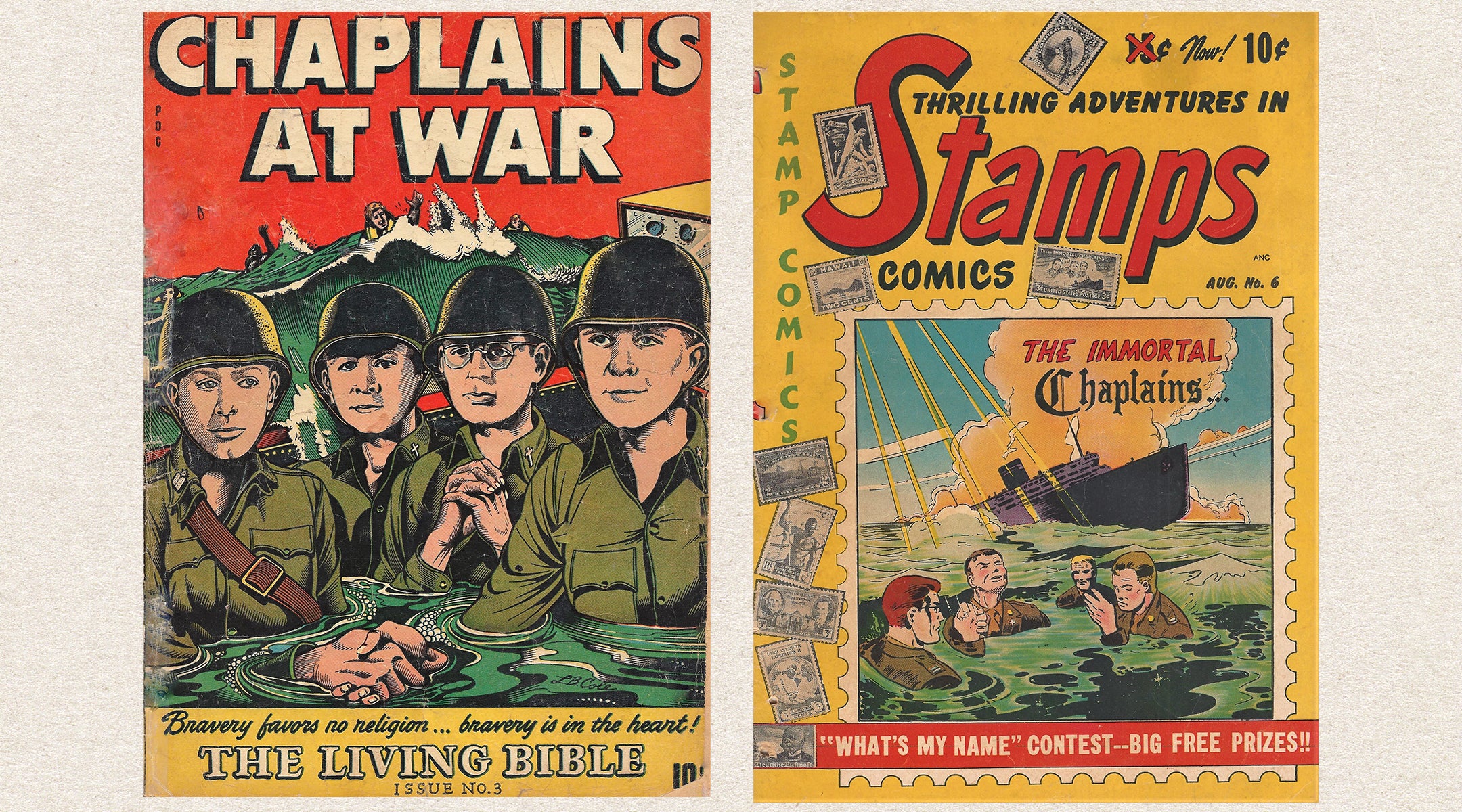
For a time in the postwar era, the story of the chaplains’ bravery was a popular one, including among children. (Courtesy Mark Auerbach)
During the postwar era, for a while, at least, the story of the Four Chaplains was a popular one. In addition to laudatory articles and the commemorative stamp — plus assorted memorabilia designed to draw the attention of children — memorials were constructed “in nearly every state,” according to Elkins; stained-glass tributes can be found at the Pentagon, the National Cathedral and elsewhere. In Philadelphia, President Harry Truman dedicated a memorial chapel to the Four Chaplains on Feb. 4, 1951. According to a JTA report at the time, some 10,000 “Americans of all faiths” raised $300,000 for the chapel’s construction and furnishings; at the ceremony, Goode’s father read Psalm 96 in Hebrew.
On Dec. 19, 1944, each of the chaplains was posthumously awarded the Purple Heart and the Distinguished Service Cross. In 1998, the 55th anniversary of the Dorchester disaster, Feb. 3 was deemed Four Chaplains Day by Congress. And yet, as World War II fades into distant memory, few people today seem to be familiar with the heroism of these men.
“It’s such an important story, such an inspiring story, it needs to be better known,” said Elkins on the impetus for his book.
“This guy certainly was a great role model,” Elkins said of Goode in particular. “We need more Alexander Goode type of people for our youth to look up to, to say, ‘I can be honest, intellectual, committed to my faith and my people, the heritage of Judaism, and I can do honorable things.’”
On Sunday, as he does every year on the Sunday closest to Feb. 3, Auerbach and other chaplains’ family members will attend a memorial mass at St. Stephen’s Roman Catholic Church in Kearny, New Jersey, where he’ll also display his collection of photographs and memorabilia. “The story is so ecumenical that it crosses all kinds of barriers,” he said. “It’s the ‘Golden Rule’ in reality. Every clergy person worth their salt — whatever day their religious observance is, whether its Saturday or Sunday — every one of them is preaching be kind to your brother, your sister. Everyone talks about it, few know about it. This is something for people to grab onto.”
Elkins concurs. “These guys are role models for all of us,” he said. “It doesn’t mean you have to give up your life. There are all kinds of ways people can do great things.”
This article originally appeared on JTA.org.
The Forward is free to read, but it isn’t free to produce

I hope you appreciated this article. Before you go, I’d like to ask you to please support the Forward.
Now more than ever, American Jews need independent news they can trust, with reporting driven by truth, not ideology. We serve you, not any ideological agenda.
At a time when other newsrooms are closing or cutting back, the Forward has removed its paywall and invested additional resources to report on the ground from Israel and around the U.S. on the impact of the war, rising antisemitism and polarized discourse.
This is a great time to support independent Jewish journalism you rely on. Make a gift today!
— Rachel Fishman Feddersen, Publisher and CEO
Support our mission to tell the Jewish story fully and fairly.
Most Popular
- 1

Fast Forward Ye debuts ‘Heil Hitler’ music video that includes a sample of a Hitler speech
- 2

Opinion It looks like Israel totally underestimated Trump
- 3

Culture Is Pope Leo Jewish? Ask his distant cousins — like me
- 4

Fast Forward Student suspended for ‘F— the Jews’ video defends himself on antisemitic podcast
In Case You Missed It
-

Fast Forward For the first time since Henry VIII created the role, a Jew will helm Hebrew studies at Cambridge
-

Fast Forward Argentine Supreme Court discovers over 80 boxes of forgotten Nazi documents
-

News In Edan Alexander’s hometown in New Jersey, months of fear and anguish give way to joy and relief
-

Fast Forward What’s next for suspended student who posted ‘F— the Jews’ video? An alt-right media tour
-
Shop the Forward Store
100% of profits support our journalism
Republish This Story
Please read before republishing
We’re happy to make this story available to republish for free, unless it originated with JTA, Haaretz or another publication (as indicated on the article) and as long as you follow our guidelines.
You must comply with the following:
- Credit the Forward
- Retain our pixel
- Preserve our canonical link in Google search
- Add a noindex tag in Google search
See our full guidelines for more information, and this guide for detail about canonical URLs.
To republish, copy the HTML by clicking on the yellow button to the right; it includes our tracking pixel, all paragraph styles and hyperlinks, the author byline and credit to the Forward. It does not include images; to avoid copyright violations, you must add them manually, following our guidelines. Please email us at [email protected], subject line “republish,” with any questions or to let us know what stories you’re picking up.







